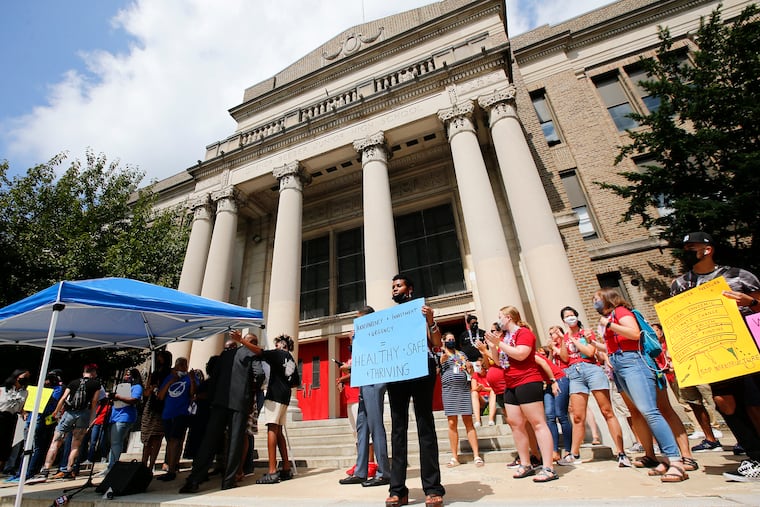Philly’s first week of school marred by inconsistent expectations and a lack of transparency | Opinion
Our kids deserve a culture change to stop the repeated mishandling of crises.

As parents and grandparents of public school children, we know all too well the challenges students have faced over the past year and a half. From social isolation and changing information on how to stay safe during the pandemic, to an unstable political climate, systemic racism, and the climate crisis, our kids are growing up in an unfathomably difficult moment. As adults, it is our collective responsibility not just to provide young people with as much stability as possible in this time, but to fight for a better future. And as elected officials, we’re concerned that our city and our state are falling short on both counts.
This became glaringly obvious this past week as the School District led a return to in-person learning marred with misinformation, inconsistent expectations, and a lack of transparency. On Thursday, we both stood in disbelief as the district notified families that there would be a two-hour delay in the school start time, moments before many schools started and after many others had already begun. Instead of making a major schedule shift the night before or in the early morning, the district waited until 8:40 a.m. to notify school communities of this change. The massive flooding and storm damage that rocked parts of the city already posed a major safety risk. Without appropriate advanced notice of the school delay, many students, educators, and staff had to confront those hazards in the early morning hours to get to school on time.
» READ MORE: Confusion reigns in Philly schools in Ida’s aftermath; other area districts closed
Then, we witnessed in real time the widespread confusion the delay caused: anxious faces of masked children not sure they would be allowed inside the school, worried parents wondering if they would make it to work on time. The district needlessly heightened stress for thousands of kids and their parents, during an unprecedented first week of school, with poor communication and planning.
This kind of disregard for our school communities has significant consequences on our caregivers’ ability to plan their lives and workdays. Even more unfortunately, this was not an isolated incident. This year, school start times shifted for many schools — often sending older students to school at 7:30 a.m. and younger siblings not until 9 a.m., information that was poorly communicated to many families. In recent weeks, teachers were shocked to reenter buildings and find serious safety risks, including dangerous unfinished asbestos and lead remediation efforts. While school communities won victories for a safe return to school, it’s unclear why parents and teachers have to fight for these basic rights and dignities in the first place. At Science Leadership Academy at Beeber, T.M. Pierce, Julia R. Masterman, Lewis C. Cassidy, and other schools, families, and staff are justifiably skeptical of the district’s ability to oversee desperately needed capital improvements to address toxic conditions.
The district’s mismanagement of facility renovations and its recent botched flood response signals a deeper issue in communication with and advocacy for school communities. The issue goes further than questionable decisions made by the district. Addressing the seemingly intractable issues around toxic schools, climate disasters, and lack of trust will require concerted effort, collaboration, and courage from all of us.
» READ MORE: Should Philly schools change their start times? | Pro/Con
At the district level, we are calling on Superintendent William R. Hite Jr. and the district to come to the table with families across the city as partners to plan for a sustainable future for our schools and improve school-community relationships. That means increased transparency around building conditions and asbestos remediation progress, improved crisis response management, and expanded opportunities for parents to participate meaningfully in decisions that impact their kids’ lives. Philly should also consider transitioning to an elected, paid school board if we seek to truly cater to the needs of working-class families.
Ignoring the huge challenges we face will not cause them to disappear from our present or future. The extreme flooding we witnessed is a reminder that the climate crisis is happening now, causing unprecedented weather events that impact us all and disproportionately impact our most vulnerable residents. This crisis demands an equally ambitious response — leveraging the influx of funds from the American Rescue Plan Act and investing in green, state-of-the-art school buildings to avoid further disruptions in our kids’ education.
It’s not a question of if but when the next COVID-19 outbreak, school facility crisis, or climate disaster will occur. But with adequate planning, open communication, and investments in our public schools that have been shortchanged for generations, we can minimize these crises’ impact on young people. It’s time that we stopped treating our children like collateral damage and started delivering on the promise of a bright, livable future for the next generation of Philadelphians.
Kendra Brooks is an at-large member of Philadelphia City Council. Elizabeth Fiedler is a state representative for Pennsylvania’s 184th District in South Philadelphia.